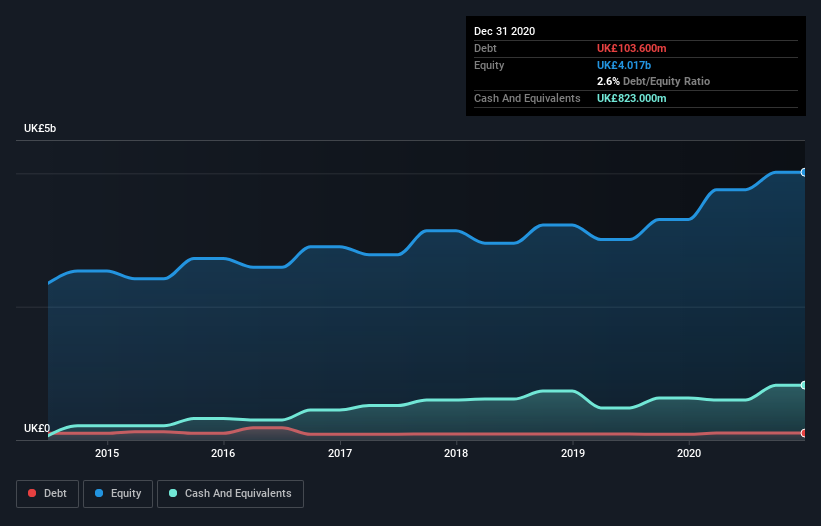Is Taylor Wimpey (LON:TW.) A Risky Investment?
Howard Marks put it nicely when he said that, rather than worrying about share price volatility, 'The possibility of permanent loss is the risk I worry about... and every practical investor I know worries about.' So it might be obvious that you need to consider debt, when you think about how risky any given stock is, because too much debt can sink a company. Importantly, Taylor Wimpey plc (LON:TW.) does carry debt. But should shareholders be worried about its use of debt?
When Is Debt Dangerous?
Generally speaking, debt only becomes a real problem when a company can't easily pay it off, either by raising capital or with its own cash flow. Part and parcel of capitalism is the process of 'creative destruction' where failed businesses are mercilessly liquidated by their bankers. However, a more common (but still painful) scenario is that it has to raise new equity capital at a low price, thus permanently diluting shareholders. By replacing dilution, though, debt can be an extremely good tool for businesses that need capital to invest in growth at high rates of return. When we examine debt levels, we first consider both cash and debt levels, together.
See our latest analysis for Taylor Wimpey
What Is Taylor Wimpey's Net Debt?
You can click the graphic below for the historical numbers, but it shows that as of December 2020 Taylor Wimpey had UK£103.6m of debt, an increase on UK£84.7m, over one year. But it also has UK£823.0m in cash to offset that, meaning it has UK£719.4m net cash.
How Healthy Is Taylor Wimpey's Balance Sheet?
Zooming in on the latest balance sheet data, we can see that Taylor Wimpey had liabilities of UK£1.01b due within 12 months and liabilities of UK£720.9m due beyond that. On the other hand, it had cash of UK£823.0m and UK£189.1m worth of receivables due within a year. So its liabilities total UK£719.7m more than the combination of its cash and short-term receivables.
Given Taylor Wimpey has a market capitalization of UK£6.09b, it's hard to believe these liabilities pose much threat. However, we do think it is worth keeping an eye on its balance sheet strength, as it may change over time. Despite its noteworthy liabilities, Taylor Wimpey boasts net cash, so it's fair to say it does not have a heavy debt load!
The modesty of its debt load may become crucial for Taylor Wimpey if management cannot prevent a repeat of the 56% cut to EBIT over the last year. When it comes to paying off debt, falling earnings are no more useful than sugary sodas are for your health. There's no doubt that we learn most about debt from the balance sheet. But it is future earnings, more than anything, that will determine Taylor Wimpey's ability to maintain a healthy balance sheet going forward. So if you want to see what the professionals think, you might find this free report on analyst profit forecasts to be interesting.
But our final consideration is also important, because a company cannot pay debt with paper profits; it needs cold hard cash. Taylor Wimpey may have net cash on the balance sheet, but it is still interesting to look at how well the business converts its earnings before interest and tax (EBIT) to free cash flow, because that will influence both its need for, and its capacity to manage debt. In the last three years, Taylor Wimpey's free cash flow amounted to 40% of its EBIT, less than we'd expect. That weak cash conversion makes it more difficult to handle indebtedness.
Summing up
While Taylor Wimpey does have more liabilities than liquid assets, it also has net cash of UK£719.4m. So we are not troubled with Taylor Wimpey's debt use. When analysing debt levels, the balance sheet is the obvious place to start. But ultimately, every company can contain risks that exist outside of the balance sheet. For example, we've discovered 4 warning signs for Taylor Wimpey that you should be aware of before investing here.
If you're interested in investing in businesses that can grow profits without the burden of debt, then check out this free list of growing businesses that have net cash on the balance sheet.
This article by Simply Wall St is general in nature. It does not constitute a recommendation to buy or sell any stock, and does not take account of your objectives, or your financial situation. We aim to bring you long-term focused analysis driven by fundamental data. Note that our analysis may not factor in the latest price-sensitive company announcements or qualitative material. Simply Wall St has no position in any stocks mentioned.
Have feedback on this article? Concerned about the content? Get in touch with us directly. Alternatively, email editorial-team (at) simplywallst.com.

